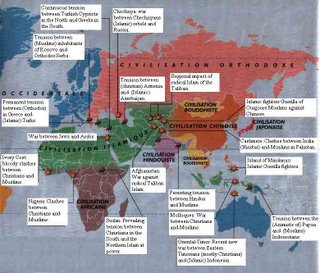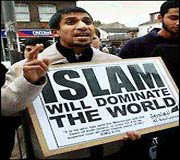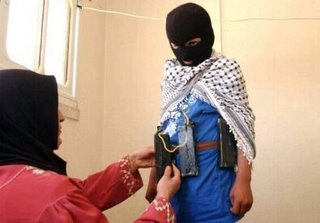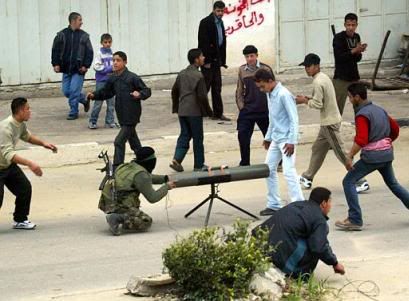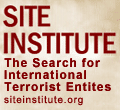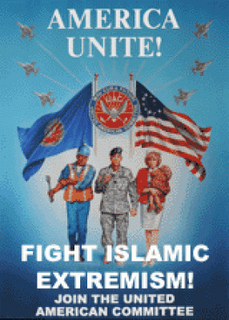Thursday, May 25, 2006
East Timor, still simmering from Islamists' brutality
http://www.mercurynews.com/mld/mercurynews/news/world/14668300.htm
9 unarmed police killed in East Timor
GUIDO GUILLIARD
Associated Press
DILI, East Timor - Soldiers fired on unarmed police in East Timor's capital Thursday, killing nine and wounding 27, as international troops landed to try to end the fighting that threatens to push the country closer to civil war.
Among the wounded were two United Nations police advisers, part of U.N. staff trying to end an hour-long attack by soldiers on the national police headquarters in Dili, U.N. spokesman Stephane Dujarric said in New York.
The U.N. police and military advisers negotiated a cease-fire with the Timorese soldiers, under which the police officers were to surrender their weapons and leave the building, Dujarric said.
"As the unarmed police were being escorted out, army soldiers opened fire on them killing nine and wounding 27 others, including two U.N. police advisers," he said.
The shooting brought to 14 the death toll of recent fighting between the country's 800-member army and a band of about 600 dismissed soldiers. Some police officers have also begun to split away and ally themselves with the dismissed soldiers, said Jean-Marie Guehenno, the chief of the U.N. peacekeeping department.
Guehenno briefed the U.N. Security Council late Thursday on the turmoil. He said the killings Thursday were preceded by a day of heavy fighting in which the army attacked police who were suspected of joining the rebel soldiers.
The police officers in the headquarters were suspected of being allied with the dissidents.
The police saw the soldiers as they left and "became nervous and started to hurry," Guehenno said. That apparently triggered the shooting.
"What I understand, in the very tense situation that existed there, there was some movement and then soldiers apparently opened fire and that's when the police officers were killed," Guehenno said.
U.N. personnel evacuated the wounded. An unspecified number were critically injured and hospitalized.
"The mission reports that U.N. personnel were able to rescue some 62 additional East Timor police officers and they are now being sheltered in the U.N. compound," Dujarric said.
Hundreds of people at East Timor's main airport cheered earlier in the day as an Australian plane delivered the first international troops sent to keep the country from civil war.
Thank God!" some cried and shouted.
The 130 Australian commandos secured the airport as gunbattles raged elsewhere in the capital, killing at least three people and wounding more than a dozen.
Australia said it will send up to 1,300 troops, along with ships, helicopters and armored personnel carriers, to the Connecticut-sized nation.
Australian Defense Minister Brendan Nelson said the full contingent will reach East Timor as early as Saturday and "will use whatever level of force is required."
"I fully anticipate we will have a calming effect,"Nelson told Australian Broadcasting Corp. radio.
New Zealand Prime Minister Helen Clark said her nation will send up 120 troops.
Australia led a multinational peacekeeping force in East Timor in 1999 that ended a rampage by Indonesian troops and their militia proxies after the former Indonesian province voted for independence from Jakarta. Some 1,500 people died.
"Welcome Aussie soldiers, please help us once again," said Judit Isaac, a 47-year-old housewife.
Meanwhile, homes and business were torched, and plumes of smoke rose over virtually deserted streets.
Two former soldiers and an army captain were killed, said the military and a spokesman for the ex-soldiers. Fourteen ex-soldiers were wounded, as was a South Korean bystander who was shot in the neck.
East Timor, the newest member of the U.N., has been plagued by unrest since more than 40 percent of its armed forces were fired in March after going on strike to protest alleged discrimination in the military.
The crisis stems in part from the rush to create an army following East Timor's independence from Indonesia. The army was set up by Australian and Portuguese military advisers, who often were at odds over training methods, language and the selection of officers.
Critics say veterans of the independence struggle - the renegade soldiers among them - often were passed over for key positions. The ex-soldiers also claim they were discriminated against because they came from the country's west, while the military leadership hails from the east.
Some hard-liners fled the capital last month after participating in deadly riots, threatening guerrilla warfare from surrounding hillsides if they were not reinstated.
The fighting prompted the government to ask for international troops earlier this week.
Preparing for the worst, dozens of foreigners fled the country. The U.S. Embassy has ordered the evacuation of all nonessential personal and advised American citizens in the country to leave.
Indonesia ruled East Timor with an iron fist for 24 years. Human rights groups say as many as 200,000 were killed under the occupation.
---
Associated Press Writers Edith M. Lederer at the United Nations and Rod McGuirk in Canberra, Australia, contributed to this story.
The peacekeeping attempts:
http://www.irishexaminer.com/breaking/story.asp?j=11980930&p=yy98x976&n=11981018&x=
Peacekeepers arrive in East Timor :: latest
International peacekeepers arrived in East Timor’s smouldering capital to restore order as gunbattles beteen renegade troops and government forces threatened to plunge the world’s youngest country into civil war.
At least three people were killed and more than a dozen wounded in fierce fighting across Dili, sending terrified residents and foreigners fleeing for safety, some rushing to the airport.
“I feel horrible, like a rat deserting a sinking ship,” said Australian Margaret Hall, who arrived in the country several months ago with an organisation that is helping provide maternal and child healthcare. “But I’m confident we’ll be back.”
The unrest in East Timor is the most serious threat to the desperately poor country since it broke from Indonesian rule in 1999 in massive violence that ended only with the arrival of an Australian-led international peacekeeping mission.
The United Nations administered the tiny nation for the next three years, during which time the army was formed, critics say too hastily, contributing to the present crisis.
The latest dispute started in March when 600 soldiers, nearly 40% of East Timor’s entire armed forces, were fired after going on strike to protest alleged discrimination in the military.
Some hard-liners fled the capital, hunkering down in surrounding hills and threatening guerrilla warfare if they were not reinstated.
Gunbattles erupted Thursday for a third day in several parts of Dili, including near President Xanana Gusmao’s office and the UN compound where around 1,500 residents had sought refuge.
Homes and business were torched, with plumes of smoke rising over virtually deserted streets.
Two former soldiers and an army captain were killed, bringing the death toll in this week’s bloodshed to five, said the military and Lieutenant Gastao Salsinha, a spokesman for the ex-soldiers. Fourteen ex-soldiers and a South Korean bystander were wounded.
Some of the fiercest fighting took place when unidentified gunmen attacked police headquarters, suggesting that elements of the police had now taken sides in the conflict, said a UN staffer.
The chaos prompted the fledgling nation’s government to ask for international troops.
The first of 1,300 Australian forces arrived today in an Australian military plane, welcomed by hundreds of cheering East Timorese seeking refuge at the airport, some clapping, crying and shouting “Thank God!”
“Welcome Aussie soldiers, please help us once again,” said Judit Isaac, a 47-year-old housewife, as some 100 troops in full combat gear fanned out across the airport, taking up positions in the grass in the centre of the runway.
Australian Prime Minister John Howard told reporters in his nation’s capital Canberra that the remaining troops would arrive soon.
“I have little doubt that once all of our forces are there, there will be significant return of stability and normality,” he said.
New Zealand said it was sending 60 police and soldiers. Portugal, which colonised East Timor for four centuries until 1975, also got the go-ahead to send 120 troops, while Malaysia pledged 500.
UN secretary general Kofi Annan said last night he was dispatching an envoy to the country to assess the security situation there.
Annan, in a stopover in Bangkok, declined to comment to reporters on the situation in East Timor, saying only: “Give me more time.”
The commander of the renegade forces, whom East Timor’s top military chief said he wants captured dead or alive, said bringing in peacekeepers was the only way to prevent civil war.
“This is the only solution,” Major Alfredo Reinado, commander of the 600-strong breakaway force, said in an interview with the BBC. “There is no other way, or it will be war forever. The government has taken too long. It is not capable of resolving this.”
Preparing for the worst, dozens of foreigners fled the country, including 40 Australian Embassy staff and their families.
The US Embassy has also ordered the evacuation of all nonessential personal and advised American citizens in the country to leave.
“It’s tragic that the East Timorese are fighting each other like this,” Australian Malcolm Cooler, 40, said as he waited with his wife at the Dili airport. “I’m shocked and sad.”
The roots of the security crisis are complex, analysts say, stemming in part from the rush to create an army following East Timor’s independence push.
Foreign military advisers were often at odds over training methods, and the selection and roles of officers.
Critics say veterans of the independence struggle, the renegade troops among them, were often passed over for key positions. The ex-soldiers also claim they were discriminated against because they came from the country’s west, while the military leadership hails from the east.
Indonesia ruled East Timor with an iron fist for 24 years. Human rights groups say as many as 200,000 were killed under its occupation.
_________
Flashback:
Justice for E. Timor?
Islam's other victims

